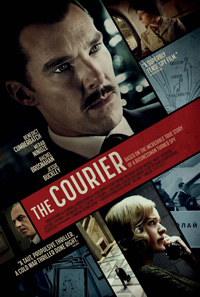You’ve Got Mail: Cooke Leaves the Cold War on Ice in Sluggish Spy Thriller
 Director Dominic Cooke, revered for his stage work before commencing on high profile Shakespearean adaptations in the series “The Hollow Crown” and making his debut in mounting Ian McEwan with 2017’s On Chesil Beach, steps outside of his wheelhouse with The Courier.
Director Dominic Cooke, revered for his stage work before commencing on high profile Shakespearean adaptations in the series “The Hollow Crown” and making his debut in mounting Ian McEwan with 2017’s On Chesil Beach, steps outside of his wheelhouse with The Courier.
The ‘based on true events’ account of Greville Wynne, a British working-class salesman recruited by MI6 and the CIA to act as a messenger with high profile GRU mole Oleg Penkovsky, gets the glossy melodrama treatment seemingly fashioned for intimate performance work rather than a historical overview. Fans of Cold War politics or of the recognizable cast should find entries of interest but it’s missing the menace of Mother Russia’s might in favor of a bromance.
As Nikita Khrushchev (Vladimir Chuprikov) readied nuclear armaments in Cuba, the Soviet leader was unaware of his artillery officer Oleg Penkovsky (Merab Ninidze) secretly funneling information to the CIA. Agent Emily Donovan (Rachel Brosnahan) alerts her MI6 counterpart Dickie Franks (Angus Wright) and together the two intelligence agencies concoct a plan to send an unassuming undercover operative to Moscow to carry secret messages from Penkovsky back to London. The man they select is an unassuming businessman, Greville Wynne (Benedict Cumberbatch), who frequently travels to Eastern Europe. Greville and Oleg develop a camaraderie until the Soviets get wise to the relationship and both men are arrested.
Greville Wynne is presented as something of a lackluster everyman, a perfect specimen of a milquetoast, innocuous agent of espionage who could easily elude Soviet attention. A drab, commonplace spy thrust into the cold, as it were, Cumberbatch isn’t exactly a prototype for blending into the background, try as the narrative does to sell him as a dull, gone-to-seed husband on the verge of alcoholism. We’ve seen Cumberbatch in this reduced mode before, notably as Alan Turning in the celebrated The Imitation Game (2014), a film which lacked any iota of interiority as regards a closeted gay man in the 1940s.
As Greville Wynne, Cumberbatch finds himself on the opposing end of a similar vibe as the happenings in this year’s The Mauritanian, as well. We’re meant to appreciate the intimacy between Wynne and Penkovsky as the impetus for the former’s noble sacrifice in an attempt to save his Soviet counterpart, and while the film does build to an anxious crescendo in the third act, it’s a bit by the numbers and cuts a few corners in demurring the execution of Penkovsky (the film’s original title, Ironbark, Penkovsky’s code name, suggested the Soviet spy was the point of interest).
The film opens with Khrushchev gnashing his way through some vitriolic diatribe about his enemies, with Tom O’Connor’s (who previously wrote The Hitman’s Bodyguard, 2017) script rightly peddling comparisons to the United States’ own despot, Number 45. Unfortunately, nothing else takes advantage of these parallels, and Georgian character actor Merab Ninidze flounders in a composite of questionable nobility. What the film and the script neglect are overarching elements which correctly paint the tone of the period or even suggest the world events which sparked the inevitability of the Cuban Missile Crisis. Instead, Cooke feels inclined to rest in the safety of domestic cliches (Jessie Buckley in a dark fright wig frets furiously about her husband’s penchant for infidelity), while the film’s other significant woman, Rachel Brosnahan, is a CIA agent purely defined by costuming, like a “Mad Men” knock-off without any key scenes.
Lensed by Sean Bobbitt (Steve McQueen’s regular DP and newly minted Oscar nominee for Judas and the Black Messiah), The Courier conjures the period well enough, but it’s more of a shapeless blob when it comes to plotting or sharply drawn cultural details. For enterprising audience members in search of answers, a revisit of Roger Donaldson’s Thirteen Days (2000) feels a good starting point to better understanding the chain of events involving the US, Cuba and the Soviet Union’s nuclear tête-à-tête.
★★½/☆☆☆☆☆


